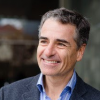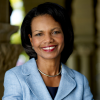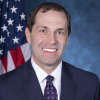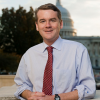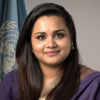Featured Speakers
The State of Democracy Around the World
-
Michael Abramowitz
President, Freedom House Michael J. Abramowitz is president of Freedom House. Before joining Freedom House in February 2017, he was director of the U.S. Holocaust Memorial Museum’s Levine Institute for Holocaust Education. He led the museum’s genocide prevention efforts and later oversaw its public education programs.
He was previously National Editor and then White House correspondent for the Washington Post. He is a member of the Council on Foreign Relations and former fellow at the German Marshall Fund and the Hoover Institution. A graduate of Harvard College, he is also a board member of the National Security Archive.
Social Media: @abramowitz
-
Madeleine Albright
Former U.S. Secretary of State Madeleine K. Albright is Chair of Albright Stonebridge Group and a professor, author, diplomat and businesswoman who served as the 64th Secretary of State of the United States. Dr. Albright received the Presidential Medal of Freedom, the nation’s highest civilian honor, from President Obama on May 29, 2012.
In 1997, Dr. Albright was named the first female Secretary of State and became, at that time, the highest ranking woman in the history of the U.S. government. As Secretary of State, Dr. Albright reinforced America’s alliances, advocated for democracy and human rights, and promoted American trade, business, labor, and environmental standards abroad. From 1993 to 1997, Dr. Albright served as the U.S. Permanent Representative to the United Nations and was a member of the President’s Cabinet. From 1989 to 1992, she served as President of the Center for National Policy. Previously, she was a member of President Jimmy Carter’s National Security Council and White House staff and served as Chief Legislative Assistant to U.S. Senator Edmund S. Muskie.
Dr. Albright is a Professor in the Practice of Diplomacy at the Georgetown University School of Foreign Service. Dr. Albright is Chair of Albright Capital Management LLC, an investment advisory firm focused on emerging markets. She also chairs the National Democratic Institute, serves as the president of the Truman Scholarship Foundation and is Honorary Co-Chair of the World Refugee Council.
Dr. Albright is a seven-time New York Times bestselling author. Her most recent book, Hell and Other Destinations was published in April 2020. Her other books include: her autobiography, Madam Secretary: A Memoir (2003); The Mighty and the Almighty: Reflections on America, God, and World Affairs (2006); Memo to the President: How We Can Restore America's Reputation and Leadership (2008); Read My Pins: Stories from a Diplomat’s Jewel Box (2009); Prague Winter: A Personal Story of Remembrance and War, 1937-1948 (2012), and Fascism: A Warning (2018).
Dr. Albright received a B.A. with Honors from Wellesley College, and Master’s and Doctorate degrees from Columbia University’s Department of Public Law and Government, as well as a Certificate from its Russian Institute.
Social Media: @madeleine
Regional Perspectives on Democratic Decline
-
E. Gyimah-Boadi
Interim CEO and Board Chair of Afrobarometer; former Executive Director of the Ghana Center for Democratic Development (CDD-Ghana) Prof. E. Gyimah-Boadi is a co-founder of Afrobarometer and served as its Executive Director from 2008 to 2019, when he became chairman of the Board of Directors (and interim CEO) of the newly registered non-profit corporation, Afrobarometer.
He is also co-founder and former executive director of the Ghana Center for Democratic Development (CDD-Ghana).
A former professor in the Department of Political Science at the University of Ghana, Legon, he has held faculty positions at universities in the United States, including the School of International Service of the American University (Washington, D.C.), and fellowships at the Center for Democracy, Rule of Law and Development (Stanford University), the Woodrow Wilson International Center for Scholars, the U.S. Institute of Peace, and the International Forum for Democratic Development (all in Washington, D.C.). A fellow of the National Academy of Sciences (U.S.) and the Ghana Academy of Arts and Sciences, Prof. Gyimah-Boadi is also a member of the editorial board of the Journal of Democracy and the International Advisory Council of the Institute for Integrated Transitions (Barcelona).
He received his doctorate from the University of California (Davis) and undergraduate degree from the University of Ghana, Legon.
Prof. Gyimah-Boadi's articles on African democratization processes have appeared in the Journal of Democracy and UNU-WIDER, among others. He is editor of Democratic Reform in Africa: The Quality of Progress, Boulder, CO: Lynne Rienner Publishers (2004) and co-author of Public Opinion, Democracy, and Market Reform in Africa (Cambridge University Press, 2005).
He has received a myriad of awards, including the 2017 Martin Luther King, Jr. Award for Peace and Social Justice for advancing democracy.
Social Media: @gyimahboadi
-
Milada Anna Vachudova
Jean Monnet Chair and Associate Professor of Political Science, UNC Chapel Hill Professor Milada Anna Vachudova specializes in party systems, political change in postcommunist Europe, European integration and the impact of international actors on domestic politics. Her recent articles explore the trajectories of European states amidst strengthening ethnopopulism and democratic backsliding – and how these changes are impacting the European Union. She is a Jean Monnet Chair and an Associate Professor of Political Science at the University of North Carolina at Chapel Hill. She is part of the core team of the Chapel Hill Expert Survey (CHES) on the positions of political parties across Europe. Her book, Europe Undivided: Democracy, Leverage and Integration After Communism (Oxford University Press) was awarded the Stein Rokkan Prize for Comparative Social Science Research. She holds a B.A. from Stanford University. As a British Marshall Scholar, she completed an M.Phil. and a D.Phil. in the Faculty of Politics at the University of Oxford. She has held fellowships from the European University Institute (EUI), the Center for European Studies at Harvard University, the National Science Foundation, the Center of International Studies at Princeton University and many other institutions. Social Media:@UNC
-
Milan Vaishnav
Director and Senior Fellow, South Asia Program, Carnegie Endowment for International Peace Milan Vaishnav is a senior fellow and director of the South Asia Program at the Carnegie Endowment for International Peace. His primary research focus is the political economy of India, and he examines issues such as corruption and governance, state capacity, distributive politics, and electoral behavior.
He is the author of When Crime Pays: Money and Muscle in Indian Politics (Yale University Press and HarperCollins India, 2017), which was awarded the Kamaladevi Chattopadhyay New India Foundation book prize for the best non-fiction book on contemporary India published in 2017. He is also co-editor (with Devesh Kapur) of Costs of Democracy: Political Finance in India (Oxford University Press, 2018) and (with Pratap Bhanu Mehta and Devesh Kapur) of Rethinking Public Institutions in India (Oxford University Press, 2017). His work has been published in scholarly journals such as Asian Survey, Governance, India Review, India Policy Forum, Studies in Indian Politics, and PS: Political Science and Politics. He is a regular contributor to several Indian publications.
Previously, he worked at the Center for Global Development, where he served as a postdoctoral research fellow, the Center for Strategic and International Studies, and the Council on Foreign Relations. He is an adjunct professor in the Edmund A. Walsh School of Foreign Service at Georgetown University and has previously taught at Columbia and George Washington Universities. He holds a Ph.D. in political science from Columbia University.
Social Media: @milanv
-
Andrés Velasco
Dean of the School of Public Policy, London School of Economics Andrés Velasco is Professor of Public Policy and Dean of the School of Public Policy at the London School of Economics and Political Science. In 2017-19 he was a member of the G20 Eminent Persons Group. During 2015-16 he co-chaired the Global Panel on the Future of the Multilateral Lending Institutions. In 2013-16 he was a member of the Global Oceans Commission. Mr. Velasco ran for the presidency of Chile in the June 2013 primaries. He also was the Minister of Finance of Chile between March 2006 and March 2010. During his tenure he was recognized as Latin American Finance Minister of the Year by several international publications. His work to save Chile´s copper windfall and create a rainy-day fund was highlighted in the Financial Times, the Economist, the Wall Street Journal and Bloomberg, among many others. In 2013-17 Mr. Velasco served as Professor of Professional Practice in International Development at the School of International and Public Affairs, Columbia University. In 2000-06 he was Sumitomo-FASID Professor of International Finance and Development at the Harvard Kennedy School. Earlier he was Associate Professor of Economics and Director of the Center for Latin American and Caribbean Studies at New York University. He received a B.A. in economics and philosophy and an M.A. in international relations from Yale University. He holds a Ph.D. in economics from Columbia University and was a postdoctoral fellow in political economy at Harvard University and the Massachusetts Institute of Technology.
Social Media: @AndresVelasco
Great Powers, Democratic Decline, and Global Liberalism
-
James Goldgeier
Senior Visiting Fellow at the Center on the United States and Europe at the Brookings Institution and Professor, American University James Goldgeier is a Robert Bosch senior visiting fellow at the Center on the United States and Europe at the Brookings Institution and a professor of international relations at the School of International Service at American University, where he served as dean from 2011-17. In 2018-19, he held the inaugural Library of Congress Chair in U.S.-Russia relations. Previously, he was a professor at George Washington University, where from 2001-05 he directed the Elliott School’s Institute for European, Russian and Eurasian Studies. He also taught at Cornell University, and has held a number of public policy appointments, including director for Russian, Ukrainian and Eurasian affairs on the National Security Council Staff, Whitney Shepardson Senior Fellow at the Council on Foreign Relations, and Henry A. Kissinger Chair at the Library of Congress. In addition, he has held appointments or fellowships at the Woodrow Wilson International Center for Scholars, the Hoover Institution, and the Stanford Center for International Security and Cooperation. He is past president of the Association of Professional Schools of International Affairs, and he co-directs the Bridging the Gap project, funded by the Carnegie Corporation of New York, and serves as co-editor of the Oxford University Press Bridging the Gap book series.
Goldgeier has authored or co-authored four books, including “Not Whether But When: The U.S. Decision to Enlarge NATO” (Brookings, 1999); “Power and Purpose: U.S. Policy Toward Russia after the Cold War” (Brookings Institution Press, 2003; co-authored with Michael McFaul); and “America Between the Wars: From 11/9 to 9/11” (PublicAffairs 2008; co-authored with Derek Chollet). He is the recipient of the Edgar S. Furniss Book Award for first time authors in the field of national security studies and the Georgetown University Lepgold Book Prize in International Relations.
He received his bachelors from Harvard and his doctorate in political science from the University of California, Berkeley.
Social Media: @JimGoldgeier
-
Kori Schake
Director of Foreign and Defense Policy Studies, AEI Kori Schake is the director of foreign and defense policy studies at the American Enterprise Institute (AEI).
Before joining AEI, Dr. Schake was the deputy director-general of the International Institute for Strategic Studies in London. She has had a distinguished career in government, working at the US State Department, the US Department of Defense, and the National Security Council at the White House. She has also taught at Stanford, West Point, Johns Hopkins University’s School of Advanced International Studies, National Defense University, and the University of Maryland.
Dr. Schake is the author of five books, among them “America vs the West: Can the Liberal World Order Be Preserved?” (Penguin Random House Australia, Lowy Institute, 2018); “Safe Passage: The Transition from British to American Hegemony” (Harvard University Press, 2017); “State of Disrepair: Fixing the Culture and Practices of the State Department” (Hoover Institution Press, 2012); and “Managing American Hegemony: Essays on Power in a Time of Dominance” (Hoover Institution Press, 2009).
She is also the coeditor, along with former Secretary of Defense Jim Mattis, of “Warriors & Citizens: American Views of Our Military” (Hoover Institution Press, 2016).
Dr. Schake has been widely published in policy journals and the popular press, including in CNN.com, Foreign Affairs, Politico, The New York Times, The Wall Street Journal, and The Washington Post. She is a contributing writer at The Atlantic and War on the Rocks.
Dr. Schake has a PhD and MA in government and politics from the University of Maryland, as well as an MPM from the University of Maryland School of Public Policy. Her BA in international relations is from Stanford University.
Social Media:@KoriSchake
Threats to Democracies
-
Condoleezza Rice
66th U.S. Secretary of State Condoleezza Rice is the Tad and Dianne Taube Director of the Hoover Institution and the Thomas and Barbara Stephenson Senior Fellow on Public Policy. In addition, she is a founding partner of Rice, Hadley, Gates & Manuel LLC, an international strategic consulting firm.
From January 2005 to January 2009, Rice served as the 66th Secretary of State of the United States, the second woman and first black woman to hold the post. Rice also served as President George W. Bush’s Assistant to the President for National Security Affairs (National Security Advisor) from January 2001 to January 2005, the first woman to hold the position.
Rice served as Stanford University’s provost from 1993 to 1999, during which time she was the institution's chief budget and academic officer. As provost, she was responsible for a $1.5 billion annual budget and an academic program involving 1,400 faculty members and 14,000 students. In 1997, she also served on the Federal Advisory Committee on Gender-Integrated Training in the Military.
From February 1989 through March 1991, Rice served on President George H.W. Bush’s National Security Council staff. She served as Director, then Senior Director, of Soviet and East European Affairs, as well as Special Assistant to the President for National Security Affairs. In 1986, while an International Affairs Fellow of the Council on Foreign Relations, Rice also served as Special Assistant to the Director of the Joint Chiefs of Staff.
As Professor of Political Science, Rice has been on the Stanford faculty since 1981 and has won two of the university’s highest teaching honors – the 1984 Walter J. Gores Award for Excellence in Teaching and the 1993 School of Humanities and Sciences Dean's Award for Distinguished Teaching.
She has authored and co-authored numerous books, most recently To Build a Better World: Choices to End the Cold War and Create a Global Commonwealth (2019), co-authored with Philip Zelikow. Among her other volumes are three bestsellers, Democracy: Stories from the Long Road to Freedom (2017); No Higher Honor: A Memoir of My Years in Washington (2011); and Extraordinary, Ordinary People: A Memoir of Family (2010). She also wrote Germany Unified and Europe Transformed: A Study in Statecraft (1995) with Philip Zelikow; edited The Gorbachev Era (1986) with Alexander Dallin; and penned The Soviet Union and the Czechoslovak Army, 1948-1983: Uncertain Allegiance (1984).
In 1991, Rice co-founded the Center for a New Generation (CNG), an innovative, after-school academic enrichment program for students in East Palo Alto and East Menlo Park, California. In 1996, CNG merged with the Boys & Girls Club of the Peninsula, an affiliate club of the Boys & Girls Clubs of America (BGCA). CNG has since expanded to local BGCA chapters in Birmingham, Atlanta, and Dallas. Rice remains an active proponent of an extended learning day through after-school programs.
Since 2009, Rice has served as a founding partner at RiceHadleyGates LLC, an international strategic consulting firm based in Silicon Valley and Washington, D.C. The firm works with senior executives of major companies to implement strategic plans and expand in emerging markets. Other partners include former National Security Advisor Stephen J. Hadley and former Secretary of Defense Robert M. Gates.
Rice currently serves on the boards of Dropbox, Inc., an online storage technology company; C3.ai, an AI software company; and Makena Capital Management, a private endowment firm. In addition, she is Vice Chair of the Board of Governors of the Boys & Girls Clubs of America and a trustee of the Aspen Institute. Previously, Rice served on various additional boards, including those of: the George W. Bush Institute; the Commonwealth Club; KiOR, Inc.; the Chevron Corporation; the Charles Schwab Corporation; the Transamerica Corporation; the Hewlett-Packard Company; the University of Notre Dame; the Foundation for Excellence in Education; the John F. Kennedy Center for the Performing Arts; and the San Francisco Symphony.
In 2013, Rice was appointed to the College Football Playoff Selection Committee, formerly the Bowl Championship Series. She served on the committee until 2017.
Born in Birmingham, Alabama, Rice earned her bachelor's degree in political science, cum laude and Phi Beta Kappa, from the University of Denver; her master’s in the same subject from the University of Notre Dame; and her Ph.D., likewise in political science, from the Graduate School of International Studies at the University of Denver.
Rice is a Fellow of the American Academy of Arts & Sciences and has been awarded fifteen honorary doctorates.
Social Media: @CondoleezzaRice
Protecting Democracy from Disinformation: The Case of Taiwan
-
Audrey Tang
Digital Minister, Taiwan Audrey Tang is Taiwan’s digital minister in charge of Social Innovation.
Audrey is known for revitalizing the computer languages Perl and Haskell, as well as building the online spreadsheet system EtherCalc in collaboration with Dan Bricklin.
In the public sector, Audrey served on Taiwan national development council’s open data committee and the 12-year basic education curriculum committee; and led the country’s first e-Rulemaking project.
In the private sector, Audrey worked as a consultant with Apple on computational linguistics, with Oxford University Press on crowd lexicography, and with Socialtext on social interaction design.
In the social sector, Audrey actively contributes to g0v (“gov zero”), a vibrant community focusing on creating tools for the civil society, with the call to “fork the government.”
Social Media: @audreyt
Protecting Democracy from Disinformation
-
Jason Crow
Congressman, Colorado (D-CO) A former Army Ranger and lawyer, Congressman Jason Crow represents Colorado’s Sixth Congressional District, encompassing Aurora and parts of Adams and Douglas Counties. Jason worked his way through college before enlisting in the Army and serving our country in Iraq and Afghanistan. Upon returning home, Jason struggled to get his veterans benefits so he went to work helping veterans across Colorado. As an attorney, Jason was named Denver’s Pro-bono Lawyer of the Year for work helping service members transition from military to civilian life. A proven reformer, Jason is working to strengthen our democracy and fight the influence of money in politics through ethics and campaign finance reform. The House passed his first bill, the End Dark Money Act, which would close a loophole that allows mega-donors to hide their political contributions, in HR 1: For the People Act. Beyond increasing government transparency, Jason is focused on preventing gun violence, protecting DREAMers and passing comprehensive immigration reform, and combating the effects of climate change.
Social Media: @RepJasonCrow
-
Jan Neutze
Senior Director, Defending Democracy Program, Microsoft As Senior Director for Digital Diplomacy, Jan Neutze leads Microsoft’s Defending Democracy Program which works to advance policy and technical solutions to defend against election interference and disinformation. Jan joined Microsoft in 2011 and has served in a range of policy and strategy leadership roles in Europe and the U.S., including leading Microsoft’s security policy team for Europe, Middle East, and Africa (EMEA) based in Brussels and leading Microsoft’s work on cyber conflict as part of the company’s Trustworthy Computing initiative in Redmond, WA.
Jan has served in a range of advisory roles on tech policy issues, such as co-chair of the Global Future Council on Cybersecurity of the World Economic Forum; as an advisor to the Partnership on Countering Foreign Influence Operations of the Carnegie Endowment; and as board member for the Global Commission on Cyber Stability.
Jan joined Microsoft from the United Nations Headquarters where he served for three years in the UN Secretary-General’s Executive Office and in the Department of Political Affairs. Jan holds a J.D. from the University of Muenster, Germany as well as an M.A. from the School of Foreign Service at Georgetown University in Washington, DC.
Social Media: @JanNeutze
-
Adrian Shahbaz
Director of Technology and Democracy, Freedom House Adrian Shahbaz is the Director for Technology and Democracy at Freedom House. He serves as a lead author for Freedom on the Net, Freedom House's annual assessment of global internet freedom, and oversees Election Watch for the Digital Age, a new project tracking the intersection of elections, internet platforms, and human rights.
A frequent commentator in the media, Adrian has appeared on or been quoted by the New York Times, Wall Street Journal, WIRED, Axios, Bloomberg, NPR, CNN, BBC, C-SPAN, Washington Post, Financial Times, and other outlets. Prior to joining Freedom House in 2013, he was a researcher at the UN Department of Political Affairs, European Parliament, and OSCE. He grew up in New York, France, and Italy as part of an Afghan-Sicilian family. He holds a master’s degree from the London School of Economics.
Social Media: @adrianshahbaz
Can Democracies Manage the Climate Crisis?
-
Jessica Green
Associate Professor of Political Science and the School of Environment at University of Toronto, St. George Jessica F. Green is Associate Professor of Political Science and the School of Environment at University of Toronto, St. George. Her research focuses on the global politics of climate change and the role of non-state actors in global governance. Her recent work examines the effectiveness of carbon pricing, the role of oil and gas firms in decarbonization, and the political economy of climate change. Her award-winning book Rethinking Private Authority, was published by Princeton University Press in 2014. Green has published in Nature, Nature Climate Change, Environmental Research Letters, International Organization among others. She is a regular contributor to the Monkey Cage column in the Washington Post, and has published in The Boston Review, The Toronto Star, The Chronicle of Higher Education, The Hill Times and Jacobin. Social Media: @greenprofgreen
-
Annika Hedberg
Head of Sustainable Prosperity for Europe programme, European Policy Center Annika Hedberg is Head of the Sustainable Prosperity for Europe Programme and Senior Policy Analyst at the European Policy Centre (EPC). She joined the EPC in 2010 and over the years has worked on a wide range of policy areas, including climate, energy, environment, health, and industrial transformation. In her role as Head of Programme, she aims to promote discussion on the drivers and foundations for a more sustainable and competitive European economy. This entails heading numerous activities (from projects to events and publications) that make the necessary linkages across sectors and policy areas required for achieving the transition to a more sustainable economy. In this context, she specialises in climate action, circular economy, smarter use of resources, the internal dimension of the EU Energy Union, and industrial transformation. She regularly writes, moderates events and speaks on these topics.
Prior to joining the EPC, she worked at the Finnish Business and Policy Forum EVA, a policy think tank in Helsinki, and at the Finnish Foreign Ministry. She has a LL.M. in Public International Law from the Helsinki University and a BSc in International Relations and History from the London School of Economics.
Social Media: @AnnikaAhtonen
-
David Orr
Paul Sears Distinguished Professor Emeritus, Oberlin College Paul Sears Distinguished Professor of Environmental Studies & Politics, Emeritus. He also served as “Counselor to the President” of Oberlin College for ten years. He is the author of eight books, including Dangerous Years: Climate Change and the Long Emergency (Yale, 2016) and Down to the Wire: Confronting Climate Collapse (Oxford, 2009) and co-editor of four others including Democracy Unchained (2020). He has authored over 220 articles, reviews, book chapters, and professional publications. In the past twenty-five years he has served as a board member or adviser to ten foundations and on the Boards of many organizations including the Rocky Mountain Institute, Bioneers, and the Aldo Leopold Foundation. He is currently a Trustee of the Alliance for Sustainable Colorado, Children and Nature Network, and the WorldWatch Institute. He has been awarded nine honorary degrees and a dozen other awards including a Lyndhurst Prize, a National Achievement Award from the National Wildlife Federation, leadership awards from the U.S. Green Building Council (2014) and from Second Nature (2012), and lifetime achievement awards from Green Energy Ohio (2015) and the North American Association for Environmental Education (2018). He has lectured at hundreds of colleges and universities throughout the U.S., Europe, Latin America, and Asia. He headed the effort to design, fund, and build the Adam Joseph Lewis Center, which was named by an AIA panel in 2010 as “the most important green building of the past thirty years,” as “one of thirty milestone buildings of the twentieth century” by the U.S. Department of Energy, and as one of “52 game-changing buildings of the past 170 years” by the editors of Building Design +Construction in January, 2016. He was instrumental in the design and funding of the Platinum-rated Peter B. Lewis Gateway Center. He is the founder of the Oberlin Project and a founder of the journal Solutions. His current work is on the repair and strengtheing American democracy that includes publication of a co-edited book Democracy Unchained: How to Rebuild Government for the People followed by public events in major cities across the U.S.
Social Media: @democracy_state
Governing Challenges: COVID-19, Climate Change, and Civil Unrest
-
Kate Brown
Governor of Oregon Kate Brown is Oregon’s 38th Governor, with nearly 30 years of experience advocating for working families and ensuring that every voice is heard in our democracy. As Governor, she dramatically expanded access to the ballot box with the nation’s first automatic voter registration program, made historic investments in education, transportation, and affordable housing, and expanded the Oregon Health Plan to reach 94 percent of adults and all Oregon children so they have access to the quality health care they deserve.
As the state grapples with the COVID-19 pandemic, Governor Brown is striving to protect the health and safety of all Oregonians, and build a safe and strong Oregon that works for everyone. And, as our nation grapples with the impacts of systemic racism, Governor Brown is committed to centering racial justice in a new vision for community safety, in the state budget and in her administration’s agenda.
Governor Brown came to Oregon to attend Lewis and Clark’s Northwestern School of Law, where she received her law degree and Certificate in Environmental Law. With her husband Dan, Brown raised Dan’s son and daughter in SE Portland. When Governor Brown is not busy at the Capitol in Salem, you will find her playing out in nature with her dog, Jory.
Social Media: @OregonGovBrown
Democracy Under Threat: Perspectives from the Front Lines
-
Laszlo Bruszt
Co-director of the CEU Democracy Institute and Professor of Sociology, Central European University Laszlo Bruszt Co-director of the CEU Democracy Institute is Professor of Sociology at the Central European University. During the regime change in 1989 he served as National Secretary of the newly formed independent trade unions and has represented them in the Roundtable Negotiations. He started to teach at CEU in 1992 and has served as its Acting Rector and President in 1996/97. Between 2004 and 2016 he was teaching at the European University Institute in Florence, Italy. His publications focus on issues of regime change and economic transformation. His more recent studies deal with the politics of economic integration of the Eastern and Southern peripheries of Europe.
-
Brett Lacy
Associate Director, Democracy Program, Carter Center Brett Lacy has worked on election observation and democratic governance projects since 1999 in more than a dozen countries. Before returning to The Carter Center in 2010, she managed civil society, political party, conflict mitigation, media, women's participation, and legislative-strengthening programs for the National Democratic Institute in West Africa. She has also worked with International Foundation for Electoral Systems, International IDEA, and the International Organization for Migration to contribute to the development of standards for the participation of refugees and internally displaced persons in post-conflict elections. Lacy previously served at the Center from 2000 – 2003, contributing to programming in Timor-Leste, Nicaragua, Guyana, and Zambia as well as the Center's Democratic Election Standards program as an assistant program coordinator. She earned a bachelor's degree in political science from Duke University and a master's degree in international administration from the University of Denver's Graduate School of International Studies.
Social Media: @CarterCenter
Tracking Bugs: COVID-19 and the Role of Surveillance in Society
-
Sheena Chestnut Greitens
Associate Professor, University of Texas at Austin and distinguished scholar at the Strauss Center for International Security and Law Sheena Chestnut Greitens is an associate professor at the LBJ School, as well as a faculty fellow with the Clements Center for National Security and a distinguished scholar with the Strauss Center for International Security and Law.
Her work focuses on East Asia, American national security and authoritarian politics and foreign policy. She is also a nonresident senior fellow at the Brookings Institution, an adjunct fellow with the Korea Chair at the Center for Strategic and International Studies, an associate in research at the Fairbank Center for Chinese Studies at Harvard University, and a member of the Digital Freedom Forum at the Center for a New American Security.
From January 2015 to August 2020, Dr. Greitens was an assistant professor of political science at the University of Missouri, and co-director of the University's Institute for Korean Studies. Her work on China and North Korea has appeared in academic journals and edited volumes in English, Chinese and Korean, and in major media outlets. She has also previously testified to Congress on security issues in the Indo-Pacific. Her first book, Dictators and their Secret Police: Coercive Institutions and State Violence (Cambridge, 2016) received the 2017 Best Book Award from both the International Studies Association and the Comparative Democratization section of the American Political Science Association.
In 2017–18, Dr. Greitens served as the first lady of Missouri, where she helped lead the state's 2017 trade mission to China and South Korea, and successfully advocated for major legislative and administrative reforms to Missouri's policies on foster care, adoption and child abuse prevention.
She holds a doctorate from Harvard University; an M.Phil from Oxford University, where she studied as a Marshall Scholar; and a bachelor's degree from Stanford University.
Social Media: @SheenaGreitens
-
Jennifer Williams
Senior Foreign Editor at Vox and co-host of Worldly Podcast Before joining Vox, Jennifer was a senior researcher at the Center for Middle East Policy at the Brookings Institution and the deputy foreign policy editor for Lawfare. Her work on jihadist groups, terrorism, and the Middle East has appeared in numerous publications including Foreign Affairs, Foreign Policy, and The National Interest.
She was a Sié Fellow at the Sié Chéou-Kang Center for International Security and Diplomacy at the Josef Korbel School of International Studies at the University of Denver, where she received her M.A. in International Studies in 2010. She speaks Arabic and has a Boston Terrier who is the love of her life.
Social Media: @jenn_ruth
Can the United States Lead a Global Democratic Vanguard?: Implications for the World
-
Derek Mitchell
President, National Democratic Institute (NDI) The appointment of Derek Mitchell as NDI’s third president is a homecoming. Beginning in September 2018, he returned to NDI just over two decades after he departed the Institute in 1997, at the conclusion of nearly four years as Senior Program Officer for Asia and the former Soviet Union.
Since that time, Mitchell has had a distinguished career in and out of the U.S. government, in which he has witnessed the connection between democracy and international security.
From 2012-2016, Mitchell served as U.S. Ambassador to the Republic of the Union of Myanmar (Burma). He was America’s first ambassador to the country in 22 years. From 2011-12, he served as the U.S. Department of State’s first Special Representative and Policy Coordinator for Burma, with the rank of ambassador.
Prior to this appointment, Mitchell served as Principal Deputy Assistant Secretary of Defense, Asian and Pacific Security Affairs (APSA), in the Office of the Secretary of Defense. In that capacity, he spent six months as acting APSA Assistant Secretary of Defense, and was responsible for overseeing the Defense Department’s security policy in Northeast, Southeast, South, and Central Asia. For his service, he received the Office of the Secretary of Defense Award for Distinguished Public Service in August 2011.
From 2001 to 2009, Mitchell served as Senior Fellow and Director of the Asia Division of the International Security Program at the Center for Strategic and International Studies (CSIS).
From 1997 to 2001, he served as Special Assistant for Asian and Pacific Affairs in the Office of the Secretary of Defense. Mitchell was the principal author of the Department of Defense’s 1998 East Asia Strategy Report, the last such report produced by DoD.
Mitchell began his work in Washington as a foreign policy assistant in the office of Senator Edward M. Kennedy (D-MA) from 1986-88.
Most recently, Mitchell has been a senior advisor at the Albright Stonebridge Group, the United States Institute of Peace, and the Center for Strategic and International Studies, as well as a lecturer for the Stanford-in-Washington program.
Mitchell has authored numerous books, articles, policy reports, and opinion pieces on international affairs. He is the coauthor of China: The Balance Sheet—What the World Needs to Know Now about the Emerging Superpower (2006), and China and the Developing World: Beijing’s Strategy for the 21st Century (2007).
Mitchell received a Master of Arts in Law and Diplomacy from the Fletcher School at Tufts University and a Bachelor’s Degree from the University of Virginia. He was a visiting scholar at Peking University in 2007. He speaks Mandarin Chinese proficiently.
His wife Min is a former television journalist. They live in Washington, D.C., with their beloved dog Bernie.
Social Media: @AmbDMitchell
-
Anders Fogh Rasmussen
Chairman, Alliance of Democracies, Former Prime Minister of Denmark, and Former Secretary General of NATO Anders Fogh Rasmussen has been at the centre of European and global politics for three decades as Secretary General of NATO, Prime Minister of Denmark, Danish Minister of Economic Affairs, Danish Minister for Taxation and a leading Danish parliamentarian.
During the Danish Presidency of the European Union in 2002, he played a key role in concluding accession negotiations with 10 candidates for EU- membership. In 2009 Anders Fogh Rasmussen was appointed NATO’s 12th Secretary General between 1 August 2009 and 30 September 2014.
His tenure in NATO marked a fundamental transformation of the Alliance. He oversaw the Alliance’s operational peak with six operations on three continents including Afghanistan, Kosovo and Libya, as well as counter-piracy along the Somali coast, a training mission in Iraq and a counter-terrorism operation in the Mediterranean. He developed a new Strategic Concept, which sets the Alliance’s core future priorities and he launched “Smart Defence” to help nations make more efficient use of their resources through more multinational cooperation. In response to Russia’s aggression against Ukraine, he initiated a “Readiness Action Plan” to strengthen the collective defence to an unprecedented level since the end of the Cold War.
On 1 October 2014, Anders Fogh Rasmussen established Rasmussen Global. The firm advises clients on a wide range of issues such as international security, transatlantic relations, the European Union, and emerging markets. Rasmussen Global draws on an extensive network of leading policy experts, former officials, business executives and consulting firms across the globe. On 1 June 2016, Mr. Rasmussen was appointed advisor to the President of Ukraine, Petro Poroshenko.
Anders Fogh Rasmussen has advocated stronger ties between the world’s democracies, including a truly “Integrated Transatlantic Community”, a Transatlantic Free Trade Agreement between the EU and North America, and a global community of democracies. In 2017, Mr. Rasmussen founded the Alliance of Democracies Foundation, a non-profit organization dedicated to the advancement of democracy and free markets across the globe. In this role, he hosts the annual Copenhagen Democracy Summit, and chairs the Transatlantic Commission on Election Integrity, which, among others, include Joe Biden, Michael Chertoff, and Felipe Calderon.
Mr. Rasmussen holds a Master’s degree in Economics from Aarhus University, and speaks English and French besides his native Danish.
Social Media: @AndersFoghR
-
Nicole Bibbins Sedaca
Deputy Director and Professor, Master of Science in Foreign Service at Georgetown University; The Kelly and David Pfeil Fellow, George W. Bush Institute Professor Nicole Bibbins Sedaca serves as the Deputy Director of Georgetown University’s Master of Science in Foreign Service (MSFS) program. She also serves as the Co-Chair for the Global Politics and Security Concentration and is a Professor in the Practice of International Affairs in MSFS.
Ms. Bibbins Sedaca has held numerous positions in the public and non-governmental sectors in the United States and Ecuador. She served for ten years in the United States Department of State, working on democracy promotion, human rights, human trafficking, religious freedom, refugees, and counterterrorism. During this time, her positions included: the Senior Advisor to the Under Secretary of State for Democracy and Global Affairs, the Senior Director for Strategic Planning and External Affairs in the Bureau of Democracy, Human Rights and Labor, and the Special Assistant to the Ambassador-At-Large for Counterterrorism. Following her governmental service, she opened and directed the International Republican Institute’s local governance program in Ecuador. She also taught at the Universidad de San Francisco de Quito (Ecuador) on democratization and conflict resolution. She also co-led the USFQ Model United Nations team that won several awards in April 2009. Prior to returning to Georgetown full-time, she served as the Director of the Washington Office of Independent Diplomat, a diplomatic advisory group. Ms. Bibbins Sedaca holds a Master’s degree from Georgetown University’s School of Foreign Service and a Bachelor’s degree in International Relations from The College of William and Mary, where she was a Presidential and Monroe Scholar. She studied at Humboldt Universitaet in Berlin, Germany, while on a Rotary International Scholarship. In 2015, she was awarded Georgetown’s 1820 Graduate Award for outstanding leadership and service by graduate alumni to the Georgetown alumni community. She has earned three Superior Honor Awards and a Meritorious Honor Award from the U.S. Department of State. While at Georgetown, she received the Dean’s Citation and Dean’s Award for Academic Excellence, and also was a Georgetown University Scholarship Recipient, Dorothy Danforth Scholarship Recipient and Edward Weintal Distinguished Scholar. From 2011 - 2019, she served as a board member and then the Chairperson of the Board of the International Justice Mission, a non-governmental organization fighting human trafficking and violence against the poor; she rejoined the board in 2020. She has served as the Chair of the Board of the Institute for Global Engagement, a non-governmental organization promoting religious freedom overseas, and also served on the Board of Georgetown’s School of Foreign Service, the William and Mary Fund and the William and Mary Washington Office.
Social Media: @NicBibSed
-
Daniel Twining
President, International Republican Institute (IRI) Dr. Daniel Twining joined IRI as president in September 2017, where he leads the Institute’s mission to advance democracy and freedom around the world. He heads IRI’s team of over 700 global experts to link people and governments, motivate people to engage in the political process, and guide politicians and government officials to be responsive to citizens.
Previously, he served as counselor to the president and director of the Asia Program at The German Marshall Fund of the United States, based in Washington, DC. As counselor, he served on the executive management team that governs GMF’s annual operations; as director of the Asia Program, he led a team working on the rise of Asia and its implications for the West.
Prior to GMF, Twining served as a member of the U.S. Secretary of State’s Policy Planning Staff, as foreign policy advisor to U.S. Senator John McCain, and as a staff member of the U.S. Trade Representative. He has taught at Georgetown University and served as a military instructor associated with the Naval Postgraduate School.
He holds a BA with highest distinction from the University of Virginia and MPhil & DPhil degrees from Oxford University, where he was the Fulbright/Oxford Scholar from 2004-07. He has been a columnist for Foreign Policy and Nikkei and has lived in Asia, Africa, Latin America, and Europe.
Social Media: @DCTwining
State of U.S. Democracy: How Much Trouble are We In?
-
Susan Glasser
Staff Writer, The New Yorker Susan B. Glasser is a staff writer at The New Yorker, where she writes a weekly column on life in Trump’s Washington.
Glasser has served as the top editor of several Washington publications; most recently, she founded the award-winning Politico Magazine and went on to become the editor of Politico throughout the 2016 election cycle. She previously served as the editor-in-chief of Foreign Policy, which won three National Magazine Awards, among other honors, during her tenure.
Before that, she worked for a decade at the Washington Post, where she was the editor of Outlook and national news. She also oversaw coverage of the impeachment of Bill Clinton, served as a reporter covering the intersection of money and politics, spent four years as the Post’s Moscow co-bureau chief, and covered the wars in Iraq and Afghanistan. She edited Roll Call, a Capitol Hill newspaper, early in her career.
Her books include “Kremlin Rising” and “The Man Who Ran Washington,” both of which she co-wrote with her husband, Peter Baker.
Social Media: @sbg1
-
Steve Israel
Former U.S. Representative, New York and Director, Cornell University Institute of Politics and Global Affairs Former Congressman Steve Israel left Capitol Hill – unindicted and undefeated – to pursue a career as a writer. In addition to writing two critically acclaimed satires of Washington, he heads the non-partisan Cornell University Institute of Politics and Global Affairs in New York City.
Israel was a Member of Congress for sixteen years. He left in 2017, having served as House Democrats chief political strategist between 2011-2015 as Chairman of the Democratic Congressional Campaign Committee. President Bill Clinton called him “one of the most thoughtful Members of Congress.” Which, Israel states, isn’t really saying much at all.
Israel is a regular political commentator on MSNBC. His insights appear regularly in the New York Times, The Atlantic Magazine, as well as The Washington Post and Wall Street Journal. He was profiled on HBO’s Last Week Tonight with John Oliver and appeared on CBS’ Sixty Minutes.
Israel is currently the Director of the new nonpartisan Institute of Politics and Global Affairs at Cornell University, the only academically-based institute of politics in the New York City metropolitan area. Its mission is to raise the discourse and deeper understanding of political issues and geopolitics. He also served as a Tisch College Visiting Fellow at Tufts University, where he taught a course called “Topics in American Politics: Inside Congress and the 2018 Midterm Elections,” and as an Institute of Politics Pritzker Fellow at the University of Chicago, where he taught a student-only and off-the-record seminar with former Congressman Tom Davis, who served on the other side of the aisle as the Chairman of the National Republican Congressional Committee (NRCC) from 1999 to 2003.
Social Media: @RepSteveIsrael
-
William Kristol
Founder and Director, Defending Democracy Together and Editor-at-large of The Bulwark Bill Kristol is editor-at-large of The Bulwark. He was a founder of The Weekly Standard, and is a regular guest on leading political commentary shows. Prior to his work at The Weekly Standard, Kristol led the Project for the Republican Future, an organization that helped shape the strategy that produced the 1994 Republican congressional victory. From 1985 to 1993, Kristol served as chief of staff to Education Secretary William Bennett in the Reagan Administration and as chief of staff to Vice President Dan Quayle in the George H. W. Bush administration. Before coming to Washington, Kristol taught politics at the University of Pennsylvania and Harvard University.
Social Media: @BillKristol
-
Sarah Lenti
Former Executive Director, The Lincoln Project Sarah Lenti is the Former Executive Director of The Lincoln Project. Lenti kicked off her career in politics by joining the Bush-Cheney 2000 campaign as a policy staffer. She served in the Bush administration on the National Security Council under National Security Advisor Condoleezza Rice. Lenti also served as an advisor to former Massachusetts Governor Mitt Romney and was the lead researcher on his book, No Apology: The Case for American Greatness. She has worked on four Presidential campaigns.
Social Media: @SarahMLenti
Rising Beyond Partisanship
-
Michael Bennet
U.S. Senator, Colorado Michael Bennet has represented Colorado in the United States Senate since 2009. Recognized as a pragmatic and independent thinker, he is driven by an obligation to create more opportunity for the next generation. Michael has built a reputation of taking on Washington dysfunction and working with Republicans and Democrats to address our nation’s greatest challenges— including education, climate change, immigration, health care, and national security. Before serving in the Senate, Michael worked to restructure failing businesses and helped create the world’s largest movie theater chain. As superintendent of the Denver Public Schools, he led one of the most extensive reform efforts in the country, resulting in substantial, sustained academic improvement for Denver’s children. He lives in Denver with his wife and three daughters.
Social Media: @SenatorBennet
-
Jeff Flake
Former U.S. Senator, Arizona “We are no longer used to great Senate speeches,” wrote Lawfare Editor in Chief, Benjamin Wittes, in October of 2017. “And then rises one Jeff Flake and delivers not merely a great speech but also a genuinely important one, perhaps the single most important address given on the Senate floor in my memory.”
Author of the New York Times best seller Conscience of a Conservative: A Rejection of Destructive Politics and a Return to Principle, Senator Flake has taken a lonely stand for principle and civility in an era of hyper-partisanship.
After serving six terms in the U.S. House of Representatives, Senator Flake was elected to the United States Senate, where he served for six years. While in the Senate, Senator Flake chaired the Subcommittee on Privacy, Technology & the Law, which sits at the intersection of innovation and regulation. He also chaired the Africa Subcommittee of the Foreign Relations Committee, where he passed landmark legislation on wildlife trafficking and democratic governance.
Prior to entering Congress, Senator Flake served as executive director of the Goldwater Institute in Arizona. He also directed the Foundation for Democracy in Namibia during that nation’s transition to independence. Senator Flake holds degrees in International Relations and Political Science from Brigham Young University.
Known for his ability to work across the political aisle, Senator Flake was the lead House Republican in the successful effort to prohibit spending earmarks, and the lead Senate Republican in the successful effort to restore diplomatic relations with Cuba.
A sought-after speaker, Senator Flake delivered the 2018 commencement address at Harvard Law School. His 2018 Senate floor speech titled “Truth and Democracy” was carried live on CNN, MSNBC and the FOX News Channel. During his time in the Senate, Senator was a frequent guest on NBC’s Meet the Press, ABC’s This Week, CBS’ Face the Nation, and CNN’s State of the Union.
Senator Flake is currently a contributor at CNN. He has guest lectured at Princeton, Yale and Stanford, and was a Resident Fellow at Harvard University. Senator Flake lectures at the Marriott School of Business at Brigham Young University, as well as at Arizona State University.
Senator Flake and his wife, Cheryl, live in Arizona and Utah, and are the parents of five children.
Social Media: @JeffFlake
A Hard Look in the Mirror: Race and American Democracy
-
Leslie Herod
State Representative, Colorado Representative Leslie Herod was elected in 2016 as the first LGBTQ African American in the Colorado General Assembly. Since then, she has passed 72 bills, addressing criminal justice reform, mental health, addiction, youth homelessness, and civil rights protections.
Some of her signature work includes:
-
- Ending cash bail for minor offenses
- De-felonizing drug possession
- Giving every Colorado newborn a $100 college kickstarter account
- Providing free menstrual hygiene products to inmates in Colorado’s prisons and jails
- Passing a comprehensive police accountability bill following the highly public murder of George Floyd, and the nationwide movement that followed
In addition to winning reelection in 2018, Herod championed a ballot initiative - Caring for Denver - that raises $35 million annually for mental health and substance abuse treatment and services for children and adults.
Herod is the Chair of the Appropriations Committee, a member of the Committee on Legal Services, a member of the Joint Budget Committee, and the Chair of the Colorado Black Democratic Legislative Caucus
Social Media: @leslieherod -
Democracy in Action: Youth Movements for Social Change
-
Tay Anderson
Member, Denver Public Schools Board of Education and Community Activist Tay Anderson is a product of Denver Public Schools where he graduated from Denver’s Manual High School in 2017. After high school he began to serve the students of Denver as an educator at University Park Elementary and North High School. He has served in the Colorado State Legislature as a legislative aide, where he advised legislators on policy around education, homelessness, gun control and more. Tay has served the Democratic Party in many roles and has been awarded the Murphy Roberts Award by the Colorado Democratic Party for his continuous service to the party. Tay is passionate about making the world a better place than the one he grew up in. He has dedicated his life on protecting women’s rights, African American rights, Latinx rights, LGBTQIA+ rights, Indigenous rights, Muslim rights, and disabled persons’ rights. He has participated in numerous public demonstrations as well as conversations and meetings with school district leaders, state leaders, and members of Congress on social justice issues. Tay gets his passion and perseverance from his mother and grandmother. His grandmother is a retired educator of 35 years. His family is comprised of educators and they have over 115 years of combined experience teaching our students to step into their greatness.
Social Media: @DirectorTay
-
Juela Hamati
Former President, European Democracy Youth Network Juela Hamati was born in Gramsh, Albania in 1994. At the age of 16, Juela became involved in youth politics as a member of the Youth Forum of the Democratic Party (DP) of Albania. At the age of 18, she became International Secretary of the party’s youth wing.In 2017, Juela joined the DP’s International Committee and since then has taken a number of responsibilities within the DP. She is also a member of the DP National Council. Juela has a Bachelor degree in Law and is finishing a Master program focused on EU legislation and institutions. Juela speaks fluent English, Spanish and Italian. Until December 2020, Juela was the President and co founder of European Democracy Youth Network which has over 250 members in 22 countries coming from politics and civil society.
Social Media: @HamatiJuela
-
Hasler Iglesias
Youth Coordinator, Voluntad Popular, Venezuela Political leader affiliated to Voluntad Popular political party where he serves as a National Youth Coordinator. Former President of the Students Federation of the Central University of Venezuela. Chemical Engineer currently pursuing a postgraduate diploma in Oil Politics and a Master's degree in Public Management. Is the founder and CEO of the Safe Water project that aims to deliver quality water to vulnerable communities in Venezuela. Social Media: @HaslerIglesias
-
Jayathma Wickramanayake
UN Secretary-General's Envoy on Youth Ms. Jayathma Wickramanayake was appointed as the UN Secretary-General’s Envoy on Youth in June 2017 at the age of 26. She is the youngest senior official in the UN and the first woman to hold this position. In this role, Jayathma works to expand the UN’s youth engagement and advocacy efforts across all four pillars of the organization’s work — sustainable development, human rights, peace and security, and humanitarian action — and serves as a representative of and advisor to the Secretary-General.
In 2019 Jayathma was recognized by Time Magazine as one of the “Time 100 Next: Rising stars shaping the future” and in 2020 she was recognized by Forbes magazine as part of its “30 under 30” list.
Originally from Sri Lanka, Ms. Wickramanayake has worked extensively on youth development and participation, including playing a key role in transforming the youth development sector in her home country.
Prior to taking up her post, Ms. Wickramanayake was instrumental in creating the movement for civic and political engagement of young people, especially young women, in Sri Lanka through the “Hashtag Generation” movement. Previously, she advocated for global youth development on an international level including as the first ever Sri Lankan Youth Delegate to the United Nations and as the youth lead negotiator and member of the International Youth Task Force of the World Conference on Youth 2014 where she played a critical role in mainstreaming youth in the Post-2015 Process and in the establishment of World Youth Skills Day.
Social Media: @jayathmadw
Civic Engagement and Robust Democracies
-
Dawn Nakagawa
Executive Vice President, Berggruen Institute Dawn Nakagawa is the Executive Vice President of the Berggruen Institute, which was launched in 2010 with Dawn as its first employee. In this position, she develops strategy, develops and launches projects, oversees management of finances and operations and builds the team. The mission of the organization is to deepen our understanding of the great transformations of our time and develop social and political institutions adapted to them. The key projects of the institute include the Future of Democracy, Transformations of the Human, Globalization and the New Multilateralism, and Economic Transformations. Special initiatives include the Berggruen Prize and Noema Magazine.
Dawn is co-director of the Future of Democracy program area and oversees special projects such as the Renovating Democracy for the Digital Society project, which she launched in 2016 with Matt Browne, the founder of Global Progress. The project works with policy makers and academics to understand the impact of changes in communications technology on democratic institutions and how to adapt.
Prior to joining the Berggruen Institute, Dawn was the Executive Vice President of the Pacific Council on International Policy, a global affairs organization based in Los Angeles. In her position, she oversaw all aspects of the organization and drove several special initiatives including the Energy and Security Committee and the Equitable Globalization Committee. She also co-directed the California Adaptation Advisory Council to the State of California under Governor Schwarzenegger.
Prior to joining the Pacific Council, Dawn worked as a consultant for McKinsey & Company, where she developed growth strategy for Fortune 500 companies in a variety of industries, focusing on the high tech and biotech industries. She holds an MBA from the University of Chicago Booth School of Business and an undergraduate degree in Political Science from McGill University in Canada. Dawn sits on the advisory board of Blueprints and the Values Schools charter organization, Think Long Committee, Inc. Dawn is a founding member of the LA chapter of Awesome Foundation. She lives in Hermosa Beach, California, with her husband Gene and two children, Ty and Jada.
Social Media: @berggruenInst
-
Jerzy Pomianowski
Executive Director, European Endowment for Democracy Jerzy Pomianowski has worked in international affairs for almost 30 years as Deputy Foreign Minister of Poland, Director of OECD-UNDP’s Partnership for Democratic Governance and Poland’s Ambassador to Japan.
In 2013, he led the establishment of the European Endowment for Democracy (EED) and has since served as its Executive Director.
Pomianowski began his career as a civil servant in 1990, just after the fall of communism, first in the Ministry of Education, and then in the Ministry of Foreign Affairs. He oversaw the launch of Poland Aid (2006-2008) and served as Director General of the Polish Foreign Service (2005-2006).
Before 1989, Pomianowski was an active member of the democratic opposition in Poland. He was Chief-Editor of the Independent Publishing House at the Warsaw University, his Alma Mater.
In his free time, he serves as president of the Polish Aikido Federation.
Social Media: @j_pomianowski
-
Christopher Walker
Vice President for Studies and Analysis, National Endowment for Democracy Christopher Walker is Vice President for Studies and Analysis at the National Endowment for Democracy (NED), a private, nonprofit foundation dedicated to the growth and strengthening of democratic institutions around the world. In this capacity, he oversees the department responsible for NED’s multifaceted analytical work and is part of NED’s executive leadership team. He is an expert on democratic development and authoritarian regimes, and has been at the forefront of the discussion on authoritarian influence on open societies, including through what he has termed “sharp power.” Walker has testified before congressional committees and appeared regularly in the media. His articles have appeared in numerous publications, including the Financial Times, Wall Street Journal, New York Times, Washington Post, Foreign Affairs, and the Journal of Democracy. He is co-editor (with Larry Diamond and Marc Plattner) of the edited volume Authoritarianism Goes Global: The Challenge to Democracy (Johns Hopkins University Press, 2016), and co-editor (with Jessica Ludwig) of the report Sharp Power: Rising Authoritarian Influence (NED’s International Forum for Democratic Studies, 2017).
Social Media: @Walker_CT
The Future of Democracy
-
Jared Polis
Governor of Colorado Governor Polis is an entrepreneur, education leader, and public servant. He started his first business, American Information Systems, while in college out of his dorm room. By the time he was 30, he’d launched three successful companies, including ProFlowers, one of the world’s leading online flower retailers. Jared’s pioneering role in the internet economy earned him an “Entrepreneur of the Year” distinction from Ernst and Young.
Following these business success, Governor Polis committed himself to making sure other Coloradans had the opportunity to pursue their dreams. He co-founded Techstars, a startup accelerator that mentors entrepreneurs from all walks of life, and Patriot Boot Camp, which helps veterans start their own small businesses after coming home from their service.
In addition to his career as an entrepreneur, much of Governor Polis’ adult life has been focused on improving public education. He served six years on the State Board of Education, where he worked to raise pay for teachers and reduce class size for students. He also founded several public charter schools for at-risk youth, and served as superintendent of one of them, the New America School, which helps immigrants earn their high school diploma.
Most recently, Governor Polis served as the U.S. representative for Colorado’s Second Congressional District, which stretches from Larimer County and the Wyoming border, to the Central Mountains at the heart of Colorado’s tourism economy, to Boulder and the U.S. 36 high-tech corridor. During his time in Congress, the Center for Effective Lawmaking ranked Governor Polis the most effective member of Colorado’s House delegation due to his success working across the aisle to improve Colorado’s schools, protect public lands, and support startups and small businesses.
Governor Polis is a Colorado native, born in 1975. He, his partner Marlon, and their two children are all avid Rockies fans.
Social Media: @GovofCO
Bolstering Democracy at Home and Abroad?
-
Daniel Baer
Senior Fellow, Carnegie Endowment for International Peace Dan Baer is a senior fellow at the Carnegie Endowment for International Peace. He was a diplomatic fellow at the University of Denver’s Josef Korbel School of International Studies from 2017 to 2019. He served in Governor John Hickenlooper’s cabinet as executive director of the Colorado Department of Higher Education from 2018 to 2019. Under President Obama, he was U.S. ambassador to the Organization for Security and Cooperation in Europe (OSCE) from 2013 to 2017. Previously, he was a deputy assistant secretary of state for the Bureau of Democracy, Human Rights, and Labor from 2009 to 2013. Before his government service, Baer was an assistant professor at Georgetown’s McDonough School of Business, a faculty fellow at Harvard’s Safra Center for Ethics, and a project leader at the Boston Consulting Group.
He has appeared on CNN, Fox, MSNBC, BBC, PBS Frontline, Al Jazeera, Sky, and the Colbert Report. His writing has appeared in the Washington Post, the Wall Street Journal, USA Today, Foreign Affairs, Politico, the Christian Science Monitor, Foreign Policy, the Chronicle of Higher Education, Westword, the Denver Post, and other publications. He holds a doctorate in international relations from Oxford, where he was a Marshall Scholar, and a degree in social studies and African American studies from Harvard. He is married to Brian Walsh, an economist at the World Bank.
Social Media:
-
William J. Dobson
Co-Editor, Journal of Democracy William J. Dobson is the coeditor of the Journal of Democracy. Prior to assuming this position, he was the Chief International Editor at NPR where he led the network’s award-winning international coverage and oversaw a team of editors and correspondents in 17 overseas bureaus and Washington, DC.
Dobson is the author of The Dictator’s Learning Curve: Inside the Global Battle for Democracy, which examines the struggle between authoritarian regimes and the people who challenge them. It was selected as one of the “best books of 2012” by Foreign Affairs, the Atlantic, The Telegraph, and Prospect, and it has been translated into many languages, including Chinese, German, Japanese, and Portuguese.
Prior to joining NPR, Dobson was Slate magazine’s Washington Bureau Chief, overseeing the magazine’s coverage of politics, jurisprudence, and international news. Dobson led the magazine’s award-winning coverage of the 2012 U.S. presidential election and expanded the magazine’s analysis of international news and politics.
Previously, he served as the Managing Editor of Foreign Policy, overseeing the editorial planning of its award-winning magazine, Web site, and nine foreign editions. During his tenure, Foreign Policy was nominated for the National Magazine Award five years in a row, winning the top honor twice.
Earlier in his career, Dobson served as Newsweek International’s Senior Editor for Asia, managing a team of correspondents in more than 15 countries. He conceived and coordinated the magazine’s annual Special Issue on Asia, which earned six honors from the Society of Publishers of Asia, including Best Reporting. Previously, he also served as an Associate Editor at Foreign Affairs.
During the height of the Arab Spring, the Washington Post commissioned Dobson to write daily on modern authoritarianism and democratic movements. While in Cairo, Dobson reported the first account of the Egyptian military conducting torture of female protestors near Tahrir Square.
Dobson has published widely on international relations, democracy, and authoritarianism. His articles and essays have appeared in the New York Times, Washington Post, Financial Times, Wall Street Journal, Foreign Policy, The New Republic, Newsweek, and elsewhere. He has provided commentary and analysis on international politics for NPR, ABC, CNN, CBS, and MSNBC.
From 2008 to 2009, Dobson was a Visiting Scholar at the Carnegie Endowment for International Peace. In 2006, Dobson was named a Young Global Leader by the World Economic Forum. Dobson is a 1994 Truman Scholar.
Dobson holds a law degree from Harvard Law School and a Master’s degree in East Asian Studies from Harvard University. He received his Bachelor’s degree, summa cum laude, from Middlebury College.
Social Media: @JoDemocracy
-
Tamara Cofman Wittes
Senior Fellow, Center for Middle East Policy, Brookings Institution Tamara Cofman Wittes is a senior fellow in the Center for Middle East Policy at Brookings, where she focuses on U.S. policy in the Middle East.
Wittes served as deputy assistant secretary of state for Near Eastern affairs from November of 2009 to January 2012, coordinating U.S. policy on democracy and human rights in the Middle East during the Arab uprisings. Wittes is a co-host of Rational Security, a weekly podcast on foreign policy and national security issues. She is currently writing a book, Our SOBs, on the tangled history of America’s ties to autocratic allies.
Wittes joined Brookings in December of 2003. Previously, she served as a Middle East specialist at the U.S. Institute of Peace and director of programs at the Middle East Institute in Washington. She has also taught courses in international relations and security studies at Georgetown University. Wittes was one of the first recipients of the Rabin-Peres Peace Award, established by President Bill Clinton in 1997.
Wittes is the author of "Freedom’s Unsteady March: America’s Role in Building Arab Democracy" (Brookings Institution Press, 2008) and the editor of "How Israelis and Palestinians Negotiate: A Cross-Cultural Analysis of the Oslo Peace Process" (USIP, 2005). She holds a bachelor's in Judaic and Near Eastern studies from Oberlin College, and a master's and doctorate in government from Georgetown University. She is a founder of the Leadership Council for Women in National Security, and serves on the board of the National Democratic Institute. She is also a member of the Council on Foreign Relations and Women in International Security.
Social Media: @tcwittes
Right-wing Populism vs. Popular Democracy: Brazil, Philippines, and the World
-
Khuzaimah Maranda
Bangsamoro Youth Agenda Khuzaimah Maranda is a local community activist from the Lanao provinces of Mindanao in the Philippines. Maranda was born and raised in Lanao del Norte province where she witnessed first-hand the war between the government forces and the Moro Islamic Front. Khuzaimah has been actively involved in advancing the concerns of internally displaced persons affected by the Marawi crisis and in pushing for context-conscious development in her areas of operations. Khuzaimah is also engaged in the crafting of the Bangsamoro Youth Agenda for the participation of young people in governance and peace building in the region. She works closely with youth organizations and youth serving-organizations to advance the agenda of the young people in the whole picture of development in the region where she resides.
-
Jean Wyllys
Congressman, Brazil Jean Wyllys is a journalist and author of seven books, defender of the LGBTQ+ community, champion of human rights, and advocate for Afro-Brazilians. He was Brazil’s first openly gay congressman, serving two terms before leaving Brazil in 2018 because of death threats from supporters of far-right President Bolsonaro. He is currently pursuing a doctorate at the University of Barcelona and was previously visiting researcher at Harvard University. Social Media: @jeanwyllys_real
Moderators
-
Ryan Heath
Senior Editor, Politico Ryan Heath is the author of Global Translations, POLITICO’s global newsletter and podcast, and previously authored POLITICO’s U.N. Playbook, Brussels Playbook, and Davos Playbook. Ryan moderated the first presidential debate of the 2019 EU election, as part of a five year stint in the POLITICO’s European leadership team. He appears on CNN, NBC and BBC and is the author of two books on politics. Prior to POLITICO, Ryan wrote for the Sydney Morning Herald in Australia, and worked for the European Commission in Brussels as a presidential speechwriter and later as the Commission’s spokesperson for digital issues.
Social Media: @PoliticoRyan
-
Fritz Mayer
Dean, Josef Korbel School of International Studies, University of Denver Frederick ‘Fritz’ Mayer, Ph.D., is the dean of the Josef Korbel School of International Studies at the University of Denver. Dean Mayer's research interests include international trade and economic globalization and the role of storytelling in politics and collective action. He has published two single-author books, four educational publications, and numerous articles and chapters. He is affiliated with the American Political Science Association, the International Studies Association, and the Association of Public Policy and Management. Prior to DU, Dean Mayer served as professor of public policy, political science and environment; associate dean; director of the Center for Political Leadership, Innovation and Service; and director of the Program on Global Policy and Governance at the Terry Sandford School of Public Policy at Duke University. Social Media: @fwmayer
-
Jeanne Meserve
Former anchor and correspondent, CNN and ABC News Jeanne Meserve has been an anchor and correspondent for CNN and ABC News, winning two Emmy Awards, and an Edward R. Murrow Award. She also contributed to two CNN Peabody Awards for coverage of Hurricane Katrina and the Gulf Oil Spill, and anchored CNN’s award-winning coverage of Yitzhak Rabin’s assassination and the death of Princess Diana.
Meserve moderates on a wide array of subjects for groups including the Halifax International Security Forum, the International Women’s Forum, the Munich Security Conference, and the American Red Cross. In 2016 she conducted town hall meetings with six Republican presidential contenders on national security issues for Americans for Peace, Prosperity and Security.
Meserve received a B.A. in English Literature from Middlebury College, and is a recipient of the college’s Alumni Achievement Award.
Social Media: @JeanneMeserve
-
Jonas Parello-Plesner
Executive Director, Alliance of Democracies Jonas believes in fighting for democracy as his Spanish granddad did during the Spanish Civil War. He has worked in and with the three power centers of the globe; Washington, Beijing and Brussels. He tracks – and speaks up against - how authoritarian powers encroach on freedom and democracy inside liberal democracies. Social Media: @jonasPplesner
Breakout Session Moderators
-
Deborah Avant
Professor and Director of the Sié Chéou-Kang Center for International Security & Diplomacy, Josef Korbel School of International Studies Deborah Avant is the Sié Chéou-Kang Chair for International Security and Diplomacy at the Josef Korbel School of International Studies, University of Denver. Her research (funded by the Institute for Global Conflict and Cooperation, the John D. and Catherine T. MacArthur Foundation, the Smith Richardson Foundation, and the Carnegie Corporation, among others) has focused on civil-military relations, and the roles of non-state actors in controlling violence and generating governance. She is author/editor of Civil Action and the Dynamics of Violence in Conflicts (with Marie Berry, Erica Chenoweth, Rachel Epstein, Cullen Hendrix, Oliver Kaplan, and Timothy Sisk), The New Power Politics: Networks and Transnational Security Governance (with Oliver Westerwinter); Who Governs the Globe? (with Martha Finnemore and Susan Sell); The Market for Force: the Consequences of Privatizing Security; and Political Institutions and Military Change: Lessons From Peripheral Wars, along with articles in such journals as International Organization, International Studies Quarterly, Security Studies, Perspectives on Politics, and Foreign Policy. She was the inaugural director of the Sié Chéou-Kang Center for International Security and Diplomacy. Under her leadership the Sié Chéou-Kang Center launched the Private Security Monitor (http://psm.du.edu/), became a model for promoting engaged scholarship on the many different policy consequential organizations that affect peace, security, and governance, grew from one to nine affiliated faculty member, and became the first home to the International Studies Association’s newest journal: the Journal of Global Security Studies, for which she serves as editor in chief. She is an observer member of the ICoCA and, in 2013, was awarded an honorary doctorate from University of St.Gallen for her research and contribution toward regulating private military and security companies. Professor Avant regularly advises governments, companies, NGOs, and others on the roles that many play in contemporary global governance and serves on numerous governing and editorial boards. Social Media:
-
Naazneen Barma
Associate Professor and Director of the Scrivner Institute of Public Policy, Josef Korbel School of International Studies Naazneen H. Barma is Director of the Doug and Mary Scrivner Institute of Public Policy, Scrivner Chair, and Associate Professor at the Josef Korbel School of International Studies at the University of Denver. She is also one of the founders and a co-director of Bridging the Gap, an initiative devoted to enhancing the policy impact of contemporary international affairs scholarship.
Barma's research has been supported by the United States Institute of Peace, the Minerva Research Initiative, and the Berggruen Institute among others, and has been published in several refereed journals and edited volumes. She is author of The Peacebuilding Puzzle: Political Order in Post-Conflict States (Cambridge University Press, 2017), co-author of Rents to Riches? The Political Economy of Natural Resource-Led Development (World Bank, 2011), and co-editor of Institutions Taking Root: Building State Capacity in Challenging Contexts (World Bank, 2014) and The Political Economy Reader: Markets as Institutions (Routledge, 2008). She has also co-authored policy-oriented pieces on global political economic order that have appeared in Democracy: A Journal of Ideas, Foreign Policy, and The National Interest.
Prior to joining the Korbel School faculty, Barma was a professor in the Department of National Security Affairs at the Naval Postgraduate School from 2000–2010 and previously worked from 1998–2001 and 2007–2010 as a development practitioner at the World Bank.Social Media: @naazneenbarma
-
Marie Berry
Associate Professor and Director of Inclusive Global Leadership Initiative, Josef Korbel School of International Studies Dr. Marie Berry is an Associate Professor at the Josef Korbel School of International Studies at the University of Denver, where she is an affiliate of the Sié Chéou-Kang Center for International Security and Diplomacy. She is also the Director of the Inclusive Global Leadership Initiative (IGLI), an effort to catalyze research, education, and programming aimed at elevating and amplifying the work that women activists are doing at the grassroots to advance peace, justice, and human rights across the world. As a sociologist, her research focuses on violence, gender, and politics. Her first book, War, Women, and Power: From Violence to Mobilization in Rwanda and Bosnia-Herzegovina (Cambridge University Press 2018), examines the impact of war and genocide on women’s political mobilization in Rwanda and Bosnia. Her second book project explores women’s participation in movements for social change across the world. Together with Dr. Milli Lake (LSE), she runs the Women’s Rights After War Project. Dr. Berry’s award-winning work has been published in places like Gender & Society, Democratization, Signs, New Political Economy, Mobilization, Politics & Gender, Foreign Policy, The Society Pages, and Political Violence @ A Glance. Social Media: @marieeberry
-
Rachel Epstein
Professor and Associate Dean of Faculty and Research, Josef Korbel School of International Studies Rachel earned her MA and PhD from Cornell University's Department of Government and her AB from Stanford University in International Relations. Her research and teaching have focused on international political economy, international security, and the role of international organizations in eliciting compliance from target states and states-in-transition. She has published widely on subjects concerning European Union enlargement, the expansion of the North Atlantic Treaty Organization, the developmental prospects of post-communist countries and the politics of finance, financial crisis and foreign bank ownership. She has also held two post-doctoral fellowships at the European University Institute in Florence, Italy and was also an Advanced Post-Doctoral Fellow at the Freie Universitaet in Berlin in 2016. Currently she is a co-editor at the Review of International Political Economy.
-
Cullen Hendrix
Professor, Josef Korbel School of International Studies and Nonresident Senior Fellow, Peterson Institute for International Economics Dr. Cullen Hendrix is a member of the Political Instability Task Force and Africa Board of Experts for LEIDOS. He holds research appointments at the University of Texas at Austin and the Colorado School of Mines, and is Associate Editor of the Journal of Peace Research. At the Korbel School, he is the director of the Global Environmental Change and Adaptation (GECA) certificate program. Currently, he is the coordinating investigator of the Rigor, Relevance, and Responsibility Program, a Carnegie Corporation-funded project that makes ethical considerations an integral part of policy-relevant research and engagement so that future generations of academics can engage in the policy world with confidence and clarity. With Idean Salehyan, he created and maintains the Social Conflict Analysis Database.
Dr. Hendrix has broad interests in contentious politics, the political economy of development, and environmental politics. At the Korbel School, he leads the Environment, Food and Conflict (ENFOCO) Lab, which leverages collaborations between physical and social scientists and policymakers to produce scholarship and analysis on issues at the intersection of the environment, food security, and conflict. His articles have appeared in journals ranging from Nature, Nature Climate Change, Biological Reviews, Ecology and Society, Marine Policy and Global Environmental Change to the British Journal of Political Science, Journal of Conflict Resolution and Journal of Peace Research. Dr. Hendrix has authored reports published by or consulted for organizations including the Asian Development Bank, the Chicago Council on Global Affairs, Oxfam America, the National Intelligence Council, and the World Food Programme, among others.
His first co-authored book, Confronting the Curse: The Economics and Geopolitics of Natural Resource Governance, was published in 2014. A second co-edited book, Civil Action and the Dynamics of Violence, was published by Oxford University Press in 2019.
His research has been supported by the National Science Foundation’s Coupled Natural and Human Systems program, the US Department of Defense Minerva Initiative, the Carnegie Corporation, and the Smith Richardson Foundation, and he was a pre-doctoral fellow at the Peace Research Institute, Oslo. He holds a PhD and MA from the University of California, San Diego, where he was a fellow of the Institute on Global Conflict and Cooperation, and a BA from Kalamazoo College. Prior to joining the Korbel School, he held faculty positions at the College of William & Mary and the University of North Texas.Social Media: @cullenhendrix
-
Jonathan Moyer
Assistant Professor and Director of the Frederick S. Pardee Center for International Futures, Josef Korbel School of International Studies Jonathan D. Moyer is Assistant Professor at the Josef Korbel School of International Studies and Director of the Frederick S. Pardee Center for International Futures. He works across various research areas, extending and using the International Futures (IFs) integrated assessment platform. Jonathan studies patterns of human development through funded research for organizations like the African Union Development Agency and the United Nations. He leads the creation of new data and tools to better understand and analyze international relations contributing to reports such as the U.S. National Intelligence Council Global Trends 2030. Jonathan also researches patterns and drivers of state fragility and failure most notably as Lead Co-PI on a five-year Minerva grant. Social Media: @moyerjonathan
-
Aaron Schneider
Professor and Associate Dean for Academic Affairs, Josef Korbel School of International Studies Professor Schneider's work focuses on the intersection of wealth and power, and he has conducted research in Latin America, India, and Sub-Saharan Africa. In particular, he emphasizes the study of public finance as a window into the political economy of development and democracy. The way governments secure contributions from key social groups and how states decide what to do with the money tells a story about the nature of national political communities – who is in, who is out, and who will enjoy what benefits of membership.
Professor Schneider has published books on state-building in Central America and urban development in the United States, and his main ongoing enterprise is a comparative project on India and Brazil. The project explores the position and role of emerging powers in the midst of global capitalist crisis and contemporary world disorder.Social Media: @_AaronSchneider
-
Timothy Sisk
Professor and Director of the Institute for Comparative and Regional Studies, Josef Korbel School of International Studies Timothy D. Sisk is Professor of International and Comparative Politics at the Josef Korbel School of International Studies, University of Denver and Director of the Institute for Comparative and Regional Studies at the School. At the University of Denver, he also chairs the Institutional Review Board (IRB) for the Protection of Human Subjects in Research.
His research, teaching and policy-oriented work focuses on democratization and electoral processes in fragile and post-war contexts. Professor Sisk also researches the role of international and regional organizations, particularly the United Nations, in peace operations, peacemaking, and peacebuilding.
Prior to joining the University of Denver in 1998, Sisk was a Program Officer and Research Scholar in the Grant Program of the United States Institute of Peace in Washington. Sisk earned a Ph.D. “with distinction” in political science from The George Washington University, in 1992, and an MA in International Journalism (1984) and a BA in Foreign Service and German (1982) from Baylor University.
Artist in Residence
-
Kevin Kallaugher (KAL)
Cartoonist at The Economist and artist in residence for the Denver Democracy Summit Kevin Kallaugher (KAL) is the international award-winning editorial cartoonist for The Economist magazine of London, The Baltimore Sun and Counterpoint. In a distinguished career than spans 43 years, Kal has created over 10000 cartoons and 150 magazine covers. His resumé includes six collections of his published work including his celebrated 35th year anthology of Economist cartoons titled Daggers Drawn. Kal’s work has been exhibited in a dozen countries receiving awards and honors in seven. These awards include Feature Cartoonist of the Year (UK), The Thomas Nast Prize (Germany) Cartoon of the Year (Europe), and The Berryman award (US), Herblock Prize (US) and twice finalist for the Pulitzer Prize (US).
Social Media: @kaltoons






